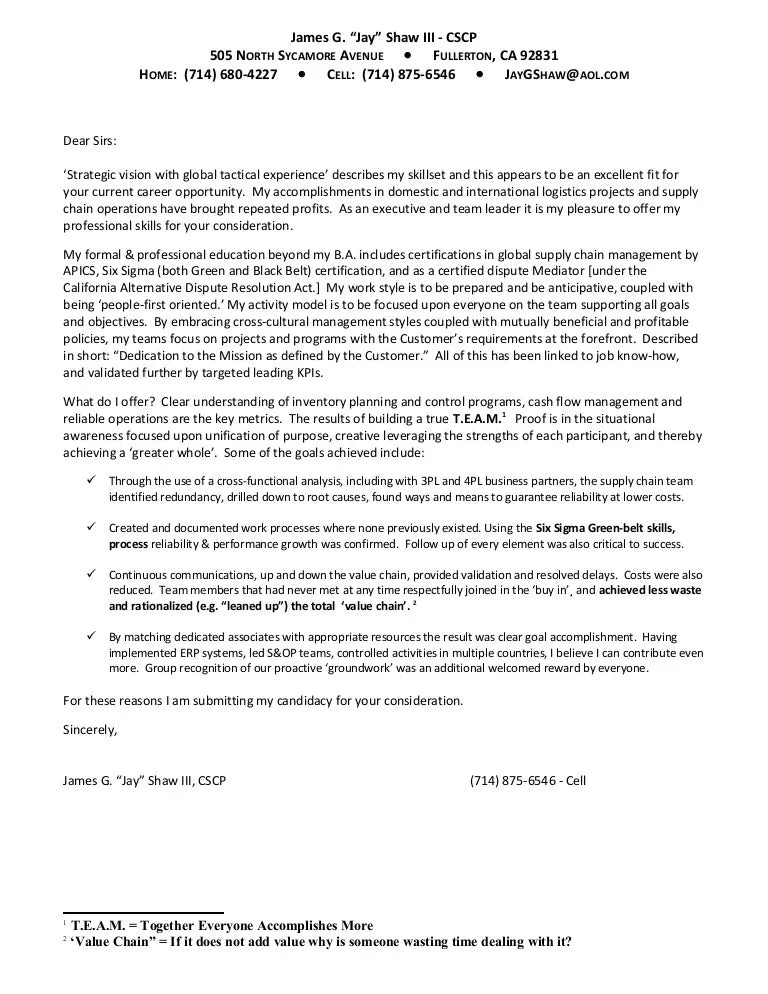Crafting a Compelling Logistics Cover Letter
A well-crafted cover letter is your first opportunity to make a strong impression on a potential employer in the competitive field of logistics. It’s more than just a formality; it’s your chance to showcase your skills, experience, and enthusiasm for the role. This guide provides essential tips and insights to help you create a cover letter that stands out and lands you your dream logistics job. Your cover letter should be tailored to each specific job application. It should demonstrate that you understand the requirements of the role and are excited about the opportunity. Focus on showcasing your achievements and explaining your qualifications for the position.
Understanding the Logistics Industry and Job Market
Before you start writing, research the logistics industry and the specific companies you’re targeting. The logistics field encompasses various sectors, including transportation, warehousing, supply chain management, and distribution. Different roles demand distinct skills and qualifications. Familiarize yourself with industry trends, the company’s mission, and its values. Highlight the areas where your skills and experience align with their needs. Show your understanding of the current challenges and opportunities facing the industry. Displaying this knowledge demonstrates your genuine interest in the role and the company. Researching the job market means identifying the key skills, experience, and qualifications employers are seeking. Adapt your cover letter to meet these requirements to increase your chances of success.
Key Skills to Highlight in Your Cover Letter
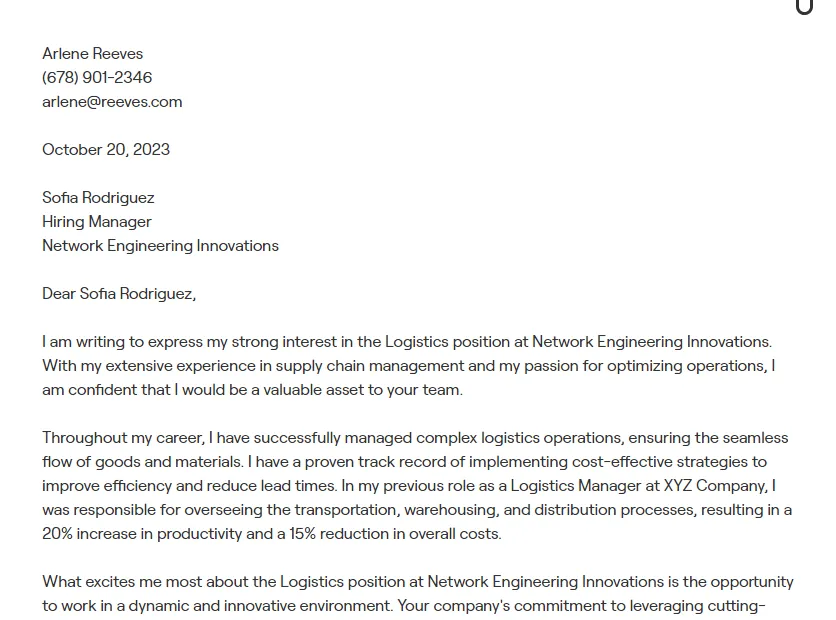
Logistics professionals require a diverse set of skills to excel in their roles. Your cover letter should emphasize the skills that are most relevant to the specific job you are applying for. Highlight your strengths and provide concrete examples to back up your claims. Use keywords from the job description to ensure your cover letter aligns with the employer’s needs. These include both hard and soft skills. Here’s a breakdown of essential skills to showcase.
Operational Efficiency and Process Improvement
Demonstrate your ability to optimize processes, reduce costs, and improve efficiency. Highlight any experience in streamlining operations, implementing new technologies, or identifying areas for improvement. Examples of your work in these areas are highly effective. Mention any initiatives that resulted in measurable improvements, such as reduced delivery times, lower transportation costs, or enhanced warehouse throughput.
Supply Chain Management Knowledge
Show your understanding of the end-to-end supply chain. Explain your familiarity with inventory management, procurement, warehousing, and distribution. This is a very critical skill to have in this field. Provide examples of how you have managed supply chains, coordinated shipments, or resolved supply chain disruptions. If you have certifications such as CSCP (Certified Supply Chain Professional), make sure to highlight them.
Communication and Teamwork Abilities
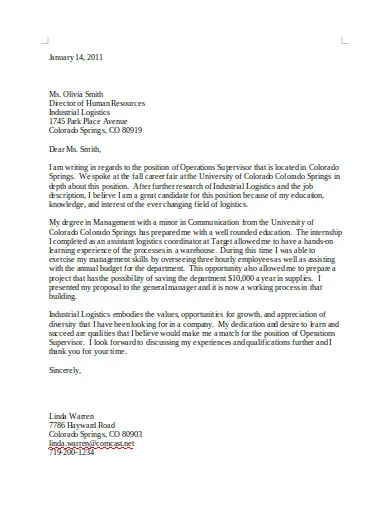
Logistics professionals must communicate effectively with various stakeholders, including suppliers, customers, and team members. Showcase your ability to communicate clearly, both verbally and in writing. Highlight your teamwork skills, and provide examples of successful collaborations. Mention any experience in leading teams, resolving conflicts, or fostering positive working relationships.
Tailoring Your Cover Letter for Logistics Roles
Customize your cover letter for each job application. Generic cover letters are easily identifiable and often lead to immediate rejection. A tailored cover letter demonstrates that you’ve taken the time to understand the specific requirements of the job and the company’s values. Customize your cover letter for each opportunity and highlight skills and experiences that align with the job description. Here’s how to do it right.
Researching the Company and the Specific Role
Before you start writing, research the company and the specific role. Understand the company’s mission, values, and recent achievements. Look into the specific responsibilities and requirements outlined in the job description. Addressing the specific needs and requirements of the company and role makes your letter much more compelling. Visit the company’s website, read news articles, and check their social media presence. Use this information to tailor your cover letter and show you are genuinely interested in the opportunity.
Highlighting Relevant Experience and Achievements
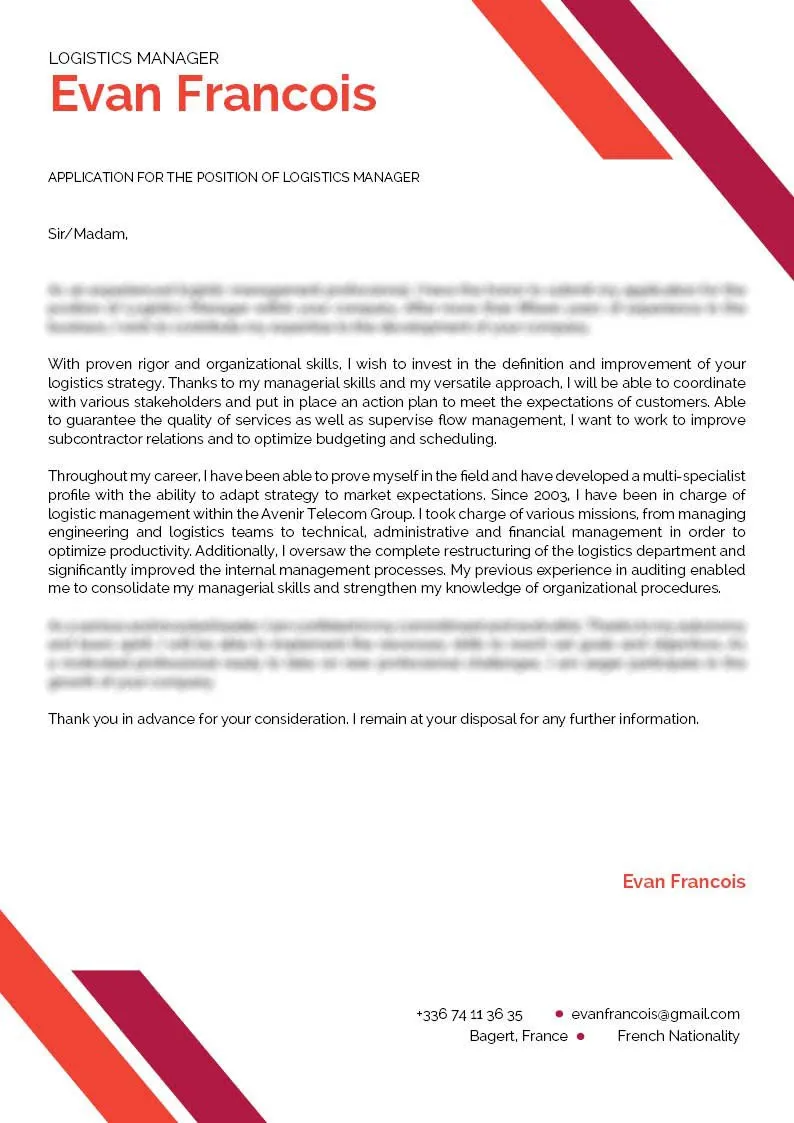
Focus on your most relevant experiences and achievements. Start by reviewing your resume and identifying the skills and experiences that align with the job description. Provide specific examples that demonstrate your capabilities. Make sure your cover letter is clear and concise, avoiding unnecessary jargon. The most relevant experiences and achievements should be front and center. Use the STAR method (Situation, Task, Action, Result) to structure your examples and show your impact.
Quantifying Your Accomplishments with Metrics
Whenever possible, quantify your achievements with specific metrics. Numbers and data make your accomplishments more concrete and help demonstrate your impact. Quantifiable data is essential for showing the impact of your achievements. Instead of saying, “Improved efficiency,” say, “Improved warehouse efficiency by 15% through process optimization.” Use percentages, numbers, and dollar amounts to provide tangible evidence of your skills and experience. This approach is very effective and helps your application stand out.
Formatting and Structure for Your Logistics Cover Letter
A well-formatted cover letter is easy to read and visually appealing. Pay attention to the layout, font, and overall structure to make a positive impression. Proper formatting makes your cover letter easier to read and helps you convey your message effectively. Use a professional format. Here are some formatting tips to follow.
Professional Font and Layout
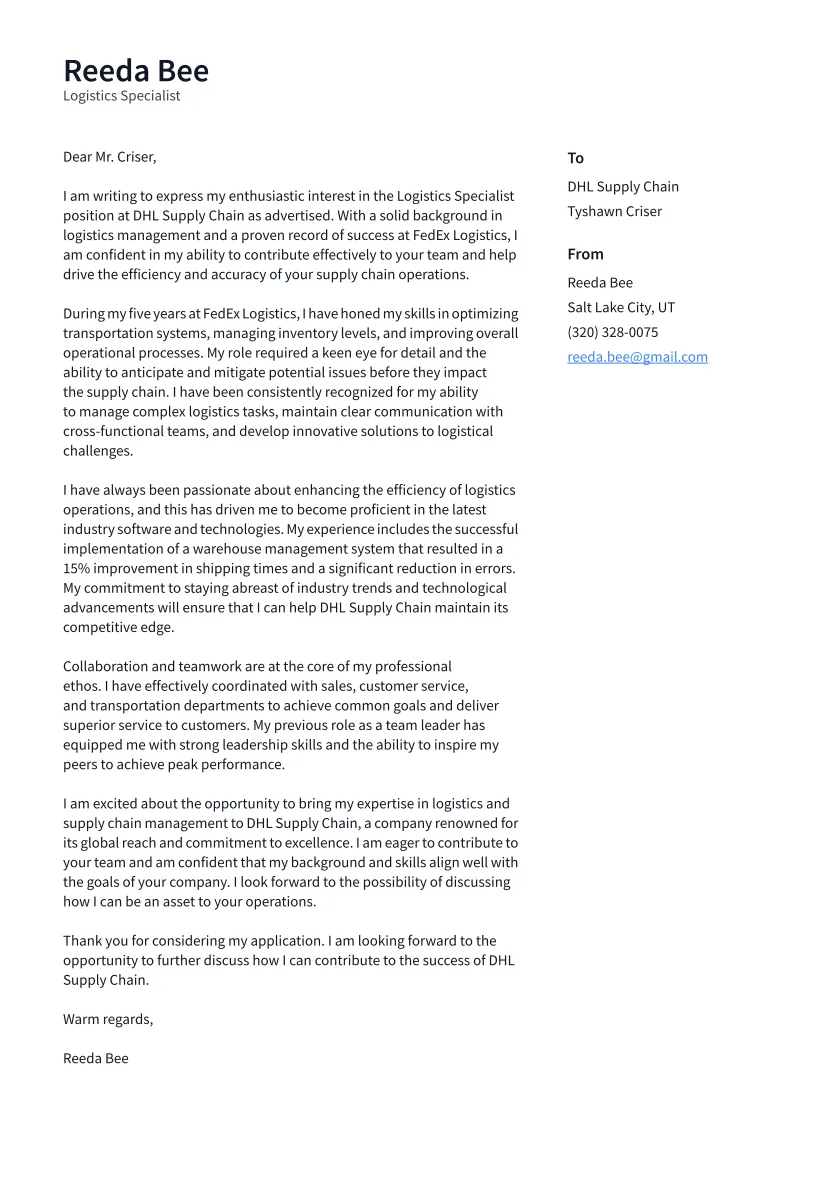
Choose a professional and easy-to-read font, such as Times New Roman, Arial, or Calibri. Use a standard font size (11 or 12 points) for the body text. Maintain consistent spacing throughout your cover letter. Use a clean layout with clear sections and adequate white space. A well-formatted layout enhances readability and makes your cover letter visually appealing. Avoid overly fancy fonts or excessive formatting, as these can distract the reader and make your letter appear unprofessional.
Proper Salutation and Closing
Begin your cover letter with a professional salutation. If possible, address the hiring manager by name. If you don’t know the hiring manager’s name, use a generic salutation, such as “Dear Hiring Manager.” Close your letter with a professional closing, such as “Sincerely” or “Best regards.” Include your name, contact information, and a call to action, like encouraging them to review your resume or schedule an interview. Ensure the salutation and closing are appropriate and professional.
Proofreading and Editing Your Cover Letter
Proofread your cover letter carefully for any errors in grammar, spelling, and punctuation. Mistakes can damage your credibility and create a negative impression. Ask a friend or colleague to review your cover letter for a second opinion. Double-check your contact information to make sure it’s accurate. A polished cover letter shows attention to detail and professionalism. Taking the time to proofread and edit can significantly improve your chances of success.
Common Mistakes to Avoid in Logistics Cover Letters
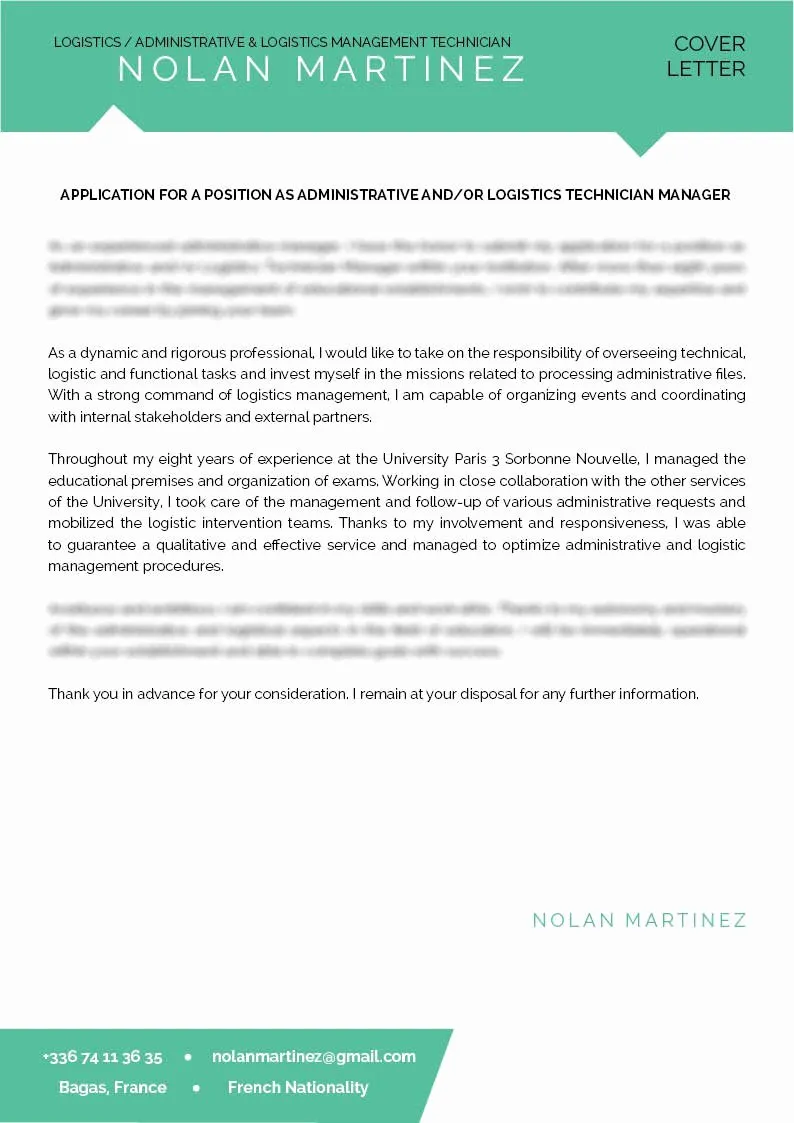
Avoiding common mistakes can significantly enhance your cover letter. These errors can quickly lead to rejection, no matter your qualifications. Always avoid the common pitfalls. Here are some of the most common mistakes to avoid.
Generic Cover Letters
Avoid using a generic cover letter that could be sent to any company. Always tailor your cover letter to the specific job and company. Generic letters show a lack of interest and are unlikely to impress hiring managers. Focus on demonstrating your genuine interest in the company and the role. Tailor your cover letter to the specific role and company. Show that you’ve done your research and understand their needs. Demonstrating this level of personalization significantly increases your chances of getting an interview.
Lack of Specific Examples
Don’t just list your skills; provide specific examples of how you’ve used those skills in the past. Hiring managers want to see evidence of your accomplishments. Use the STAR method (Situation, Task, Action, Result) to structure your examples. Instead of saying, “I am a good problem-solver,” describe a specific situation where you solved a problem and the positive outcome. Concrete examples make your claims much more believable.
Ignoring the Company’s Needs
Don’t focus solely on what you want; highlight how you can meet the company’s needs. Research the company and tailor your cover letter to show how your skills and experience align with their requirements. Focus on what you can do for the company, not just what the company can do for you. Show that you understand their goals and challenges. Demonstrating this type of understanding shows that you can contribute to their success.
Using Strong Action Verbs
Use strong action verbs to describe your accomplishments and responsibilities. Action verbs make your cover letter more dynamic and engaging. Use verbs like “managed,” “coordinated,” “optimized,” “implemented,” and “achieved.” Strong action verbs can make your cover letter more engaging and impactful. They help to convey your skills and experience effectively. Using action verbs is key. This helps to showcase your capabilities and make your application stand out. This will help convey your skills effectively, making your application more impactful.
Building a Strong and Effective Cover Letter
Creating a strong cover letter for logistics jobs is a crucial step in your job search. By following these tips and guidelines, you can create a cover letter that effectively showcases your skills, experience, and enthusiasm for the role. Tailor your cover letter to each specific job application, highlight your relevant experience and achievements, and quantify your accomplishments with metrics. Remember to proofread and edit your cover letter carefully. By avoiding common mistakes and using strong action verbs, you can significantly increase your chances of landing your dream logistics job. A well-crafted cover letter is more than just a formality; it’s your key to unlocking your career potential in logistics.
